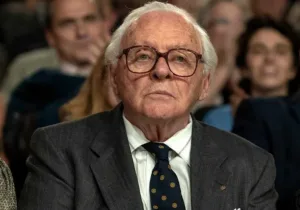Operation Finale isn’t technically about killing Holocaust logistician Adolf Eichmann but about Israel’s 1960 abduction of him from Argentina. But there’s no doubt among any of the involved parties, including Eichmann, that the ultimate goal is his execution.
The Israeli intelligence operatives assigned to abduct him are at first reluctant. Why not kill him directly in Argentina instead of riskily attempting his covert transport to Israel? Why risk themselves? Why risk the operation? Why risk the diplomatic fallout? Why allow Eichmann the trial he never permitted his millions of victims? Why allow him a global audience for his defense? Might he be persuasive with some?
Before the operatives depart, Prime Minister David Ben-Gurion visits them and soberly explains Israel’s historic duty to carefully arraign the Holocaust’s chief organizer in a court of law.
There cannot be a quiet, mysterious assassination. His crimes must be carefully delineated before the world and before him personally. His response will be heard. And he will be executed in Israel’s only case of capital punishment in civil law. The operatives listen and understand.
Abducting Eichmann wasn’t easy or destined to succeed. He lived amid a large and often sympathetic German exile community, under a regime riddled with far-right sympathizers. Argentina’s large Jewish community might help, but they also would suffer consequences after the mission became public. The Israeli civilian airlines had no regular flights to Buenos Aires, and a military plane was impossible. And how to carry Eichmann on the plane without notice?
Ben Kingsley is perfect as Eichmann but also terribly miscast. He brilliantly captures the Nazi’s shrewdness and sinister charisma. But at age 74, he’s too old for the part. Eichmann committed his crimes, portrayed as flashbacks, while in his 30s. And he’s only 54 years old in 1960, with a five-year-old son and other young children.
Young men waged the Holocaust. Hitler himself, who came to power at age 42, was only 56 when he died. Himmler was 44. Nazism was a movement of the youthful and vigorous, not old men. It’s impossible to understand otherwise. And the abduction of Eichmann was the apprehension of a man still in his prime, not his dotage. If abducted at age 74, it would have been 1980, not 1960. Menachem Begin would have been prime minister, not Ben-Gurion.
But Operation Finale is still compelling. Like any film, it’s not strictly historical. The Argentine authorities never really came close to defeating the abduction, as the film fancifully portrays to enhance the drama. A scene in which Argentine politicians and even priests convene with German exiles and give Hitler salutes seems somewhat exaggerated.
But Eichmann did live somewhat openly in Argentina, boasting of his dark exploits, impressing and terrifying German exiles, who hoped to minimize not affirm the Holocaust’s magnitude. In 1960, much of the world remained uninformed or forgetful of the Holocaust. There was little widespread international interest in hunting or prosecuting surviving Nazi mass murderers, many of whom lived quietly and comfortably.
Eichmann’s abduction provoked the usual hypocritical international complaints against Israel. But the operation’s masterful logistics and the trial’s sobriety were far more influential on the watching world. Ben-Gurion’s insistence on the mission as Israel’s providential destiny was vindicated.
Of course, Eichmann denied any meaningful responsibility and claimed he had only been a dutiful functionary with no ideological animus against Jews. Hannah Arendt famously described the “banality” of his evil. But as the film portrays, subsequent scholarship evinces that Eichmann wasn’t a mindless bureaucratic drone but a zealous Nazi organizer of genocide. He facilitated six million killings with competence and enthusiasm.
So, Eichmann had to be executed. History, justice, and morality could offer no other suitable response to his defiant central role in humanity’s most orchestrated atrocity. God’s command to Noah seems to have had Eichmann specifically in mind: “Whoso sheddeth man’s blood, by man shall his blood be shed: for in the image of God made he man.”
No less than his 6 million victims, Eichmann bore God’s image. As such, he could not escape responsibility. Justice for both the victims, and for Eichmann, required his death by the people whose destruction he sought.
Apparently raised by a devout Protestant family and ministered to during his trial by an American Zionist pastor, Eichmann died claiming to believe in God. But if he truly did, he would have accepted his execution as his own atonement. Instead, he was a liar until the end.
Operation Finale portrays earthly justice, but it also points to divine justice.






